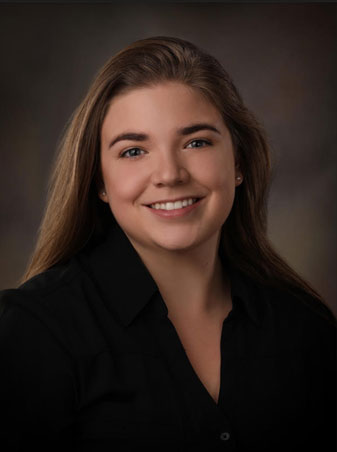According to the U.S. Department of Veterans Affairs, more than 200,000 military servicemembers transition to civilian life each year, many of whom are seeking a career where they can apply their unique skills. Military service can be a strong foundation for leadership skills, which can be applied both within a military career and the civilian workforce. University of Maryland Global Campus (UMGC) offers a master’s in transformational leadership (TLP), a program designed specifically for active-duty servicemembers, veterans, reservists, and National Guard to prepare them to lead in the civilian world.
“What sets this degree apart is that it was designed for military-affiliated professionals, including active-duty servicemembers, veterans, Reservists, and National Guard,” says Tara Konya, portfolio director of the MBA, leadership, and innovation in the School of Business at UMGC. “It’s UMGC’s only graduate program built to support the transition from military to civilian leadership, and every aspect of the curriculum reflects that mission, such as using military language, structure, and leadership frameworks to help students integrate their experience into high-impact civilian roles.”
What is a master’s in transformational leadership?
A master’s degree in transformational leadership from UMGC helps you reposition your military leadership skills and gain new competencies to transition to civilian organizations. Through scenario-based projects, students in the program use their military experience to further develop their practical skills in inclusive leadership, emotional intelligence, workforce planning, strategic communication, financial decision-making, and organizational change to help address the complex challenges leaders face today.
The program is designed to help you build on and maximize your military leadership training and skills to prepare you to transition to corporate, nonprofit, or government organizations.
“Built by military professionals for military professionals, the program recognizes military leadership experience and supports the transition of mission-focused skills into high-impact roles across corporate, nonprofit, and public-sector environments,” says Konya.
Students can also develop skills in analyzing financial and operational data to support strategic decision-making. In the program, students apply forecasting techniques, performance metrics, and planning tools to evaluate organizational effectiveness and identify areas for improvement. In courses focused on change leadership, students work with Kotter’s 8-Step Change Model, a widely adopted framework that guides leaders through the full transformation process, from creating urgency and building stakeholder buy-in to implementing change and sustaining results over time.
The program culminates in a capstone consulting project, giving students the opportunity to apply their skills in a real-world setting.
“Every student in the program has experience in leadership at one point or another during their time in the military,” says Patrick Mackey, PhD, U.S. Air Force veteran and adjunct associate professor who teaches the leadership capstone course in the program. “Their capstone is not a paper exercise; it is a leadership journey with stakes, responsibility, and outcomes. This course is where they practice what they learned and guide their selected client organization to success on a particular strategic project.”
In the capstone course, students identify a client organization and work with a designated supervisor while acting as a consultant. They conduct stakeholder interviews to assess a leadership or operational challenge, develop a strategic and financial plan, and present formal recommendations to decision-makers within the organization.
“The best part of teaching in this program is witnessing the moment when students realize they are capable of real leadership and not just filling a leadership role,” says Mackey. “That realization shows up in their confidence, their thinking, and how they communicate their ideas. It is not about perfection, it is about growth. I see students who enter the capstone course with questions, even as a Military Senior Leader, and leave the program with a vision and a voice of true and authentic transformational leadership.”
The capstone course results in a résumé-ready consulting project that demonstrates practical, civilian-relevant leadership experience, an invaluable asset for those pursuing their next career move.
To showcase the skills they’ve built, students can also earn digital credentials for each major project. These portable, verifiable badges reflect competencies in areas such as organizational leadership, critical thinking and analysis, communication, finance, presentation skills, decision making, and organizational behavior. Students can add them to LinkedIn profiles or share them with potential employers on their resume to demonstrate real-world leadership readiness.
What job titles could a master’s in transformational leadership prepare you for?
While the program prepares students to translate their military experience into civilian leadership, many choose to advance within their current military careers. Common job titles held by graduates from civilian roles include project manager and program manager to military positions including Command and Senior Enlisted Leader (SEL) roles.
“Graduates often advance into high-responsibility leadership roles across military, private, and public service sectors,” says Konya. “Each reflects increasing levels of leadership, decision-making authority, and strategic oversight.”
For those transitioning to civilian careers, students can prepare for roles such as educational specialist, supervisor, and even airline pilot. These positions require operational leadership, communication skills, and the ability to navigate complex organizational environments, skills that many graduates are equipped to handle.
Within the civilian workforce, graduates have assumed leadership roles in the nonprofit, education, and public service sectors, graduates have stepped into leadership roles within local county departments of social services, public school systems, police departments, and military public health centers. Strategic thinking, inclusive leadership, and mission-driven management can be essential to making a meaningful impact within these organizations.
Why choose UMGC to earn a master’s degree?
UMGC is one of the few accredited universities to offer a master’s degree in leadership for military professionals and veterans, and offers students a skills-based program that they can apply to the workforce right away. UMGC also makes it easier for servicemembers to get started by offering up to 12 graduate credits based on your rank and professional military education. This honors the work you've already done in your career, and can also significantly accelerate your path to graduation.
“Students often say the program feels familiar and relevant from day one, and that it gives them the language and tools they need to lead confidently in civilian organizations,” says Konya. “What makes the program so appealing is that you’re not going through it alone. You are part of a cohort of your military peers, all transitioning into civilian life together. That shared experience brings a level of support, understanding, and camaraderie that’s hard to replicate in other programs.”
In this program, career transition support is embedded into the experience. Students gain access to a program-specific version of UMGC’s CareerQuest, an online platform tailored for servicemembers exploring civilian opportunities. Inside the CareerQuest portal, students can access guided career modules on topics including job search strategies tailored to veterans, how to create an effective civilian resume, how to network and prepare for job interviews, and how to align your strengths with the right civilian career path. UMGC students also gain access to lifetime career services at no extra cost, which they can utilize at any time.
“With résumé templates, job analysis tools, mock interviews, and a personalized career plan, students leave this program with more than just a degree,” says Konya. “They graduate with a clear strategy for leading in their next chapter.”
Courses are taught by faculty who are former military leaders themselves and seasoned professionals with cross-sector leadership experience in government, business, and nonprofit organizations.
“The faculty understand where you’re coming from because they’ve been there,” says Konya. “They don’t just teach theory, they bring real-world insight and personal guidance to help you navigate your own leadership journey.”
Many students and recent graduates recommend the program to others. Patrick McCracken, a U.S. Air Force veteran, is currently completing the capstone course in the program.
“There are many great advantages to the transformational leadership program, such as the five course format or the realistic scenario-based learning. However, the military affiliation is what intrigued me most about the program,” says McCracken. “The fact that this program is geared toward building upon the leadership and management skills I learned in the military to becoming a successful and transformative leader in the civilian environment.”
McCracken’s main takeaway from the program is how the tools you learn in the program will make you a better and more reasoned leader, regardless of age or career stage.
“My favorite part of the program has definitely been working and collaborating with other military affiliated students,” says McCracken. “It’s been wonderful to get to know one another and learning from and supporting each other through the various courses.”
“My advice to other interested students would be to join this program as early as possible! People may have the impression that this program is solely aimed to set you up for success after the military, but it will absolutely make you a better military leader if you are still on active duty,” says McCracken. “The earlier you compete this program, the longer you have to apply the tools you’ve learned.”
Doug Dantzler earned his master’s in transformational leadership in May 2025, and is a veteran of the U.S. Navy.
“I wanted to further my education in leadership, and this track allowed me to obtain it within 18 months,” says Dantzler. “I learned how to put myself in senior leadership roles, with the authority and autonomy to make decisions. One of the highlights of the program for me was going through company financials and learning how to read them.”
Chester T., U.S. Air Force Reservist
Chester T., a U.S. Air Force Reservist with 18 years as an integrated avionics technician, is currently enrolled in the program with a graduation date of December 2025.
“I chose this program because while I'm skilled at the technical aspects of the job, my true passion has always been in helping others be successful in achieving their goals,” says Chester. “I would one hundred percent recommend this program. We are facing massive job uncertainty as organizations develop plans to integrate AI into the workforce and as older generations stay in the job market for longer than ever. This program will help leaders prepare their organizations and their staff for these changes and to implement them in the most ethical and least disruptive ways possible.”
For Chester, the main takeaway from this program is the importance of inspiring and guiding people to grow and excel during times of change.
“Change is successful when we have a diversity of ideas as the engine driving these massive organizational initiatives,” says Chester.
Chester’s advice to anyone interested in this program is to engage in deep self-reflection prior to enrollment.
“This is not a business management program, but rather a people leadership. If your goal is simply to help a business meet its KPI metrics, this is not the program for you,” says Chester. “However, if you want a deeper understanding of organizational behavior and to be a champion of people and a change agent, you will not find a better program.”
The online master’s in transformational leadership at UMGC can help turn your military leadership into a powerful asset in the civilian world, and drive meaningful change at every level of an organization.
“Leadership is not about titles, rank, or position. It is about taking responsibility and creating progress where you stand, and the program will show you how,” says Mackey. “Transformation begins when you lead with intention and adapt what you learn to the context you serve.”
Reference on this webpage to any third-party entity or product does not constitute or imply endorsement by UMGC nor does it constitute or imply endorsement of UMGC by the third party.

/blog-inline-military-experience-academic-credit_ph-53martin210621umgc33654_retouched.jpg)
/blog-military-veterans-day-umgc-linklist-01martin-umgc0604.jpg)
